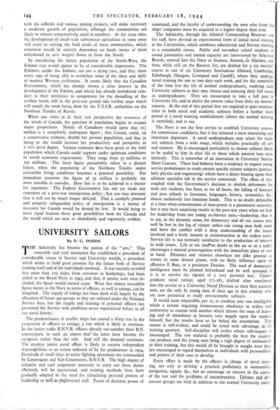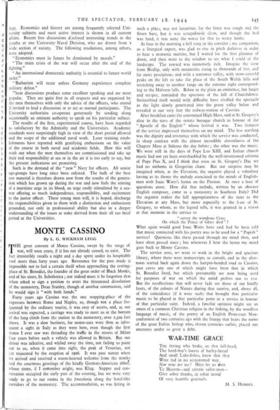UNIVERSITY SAILORS
By D. G. DODDS The predominance of smaller ships has caused a sharp rise in the proportion of officers to ratings, a rise which is likely to continue. In the junior ranks R.N.V.R. officers already out-number their R.N. counterparts to such an extent that the latter have become the exception rather than the rule. And still the demand continues. The rnodern junior naval officer is likely to receive independent responsibilities to an extent unheard of by his predecessor in 1914. Hundreds of small ships in active fighting operations are commanded by Lieutenants and Sub-Lieutenants, R.NN.R. The high degree of initiative and cppl judgement necessary to carry out these duties efficiently will be appreciated, and training methods have been gradually adapted to the need for stimulating personal powers of Icadership as well as pnafessional skill. Power of decision, power of command, and the faculty of understanding the men who form the ships' companies must be acquired to a higher degree than ever.
The Admiralty, through the Admiral Commanding Reserves and his staff, have devised an experimental form of initial naval training at the Universities, which combines educational and Service training to a remarkable extent. Public and secondary school students of sound personality and mental capacity are interviewed by Selection Boards, entered into the Navy as Seamen, Airmen,- or Marines, and then, while still on the Reserve list, are drafted for a six months' course to one of six University Institutions (Oxford, Cambridge, Edinburgh, Glasgow, Liverpool and Cardiff), where they undergo naval training for one or two days each week, and for the remainder of the time live the life of normal undergraduates, studying such University subjects as they may choose and enjoying their full status as undergraduates. They are encouraged to take a full part in University life, and to derive the utmost value from their six months' sojourn. At the end of this period they are required to pass examina- tions in both naval and academic subjects before a further short period at a naval training establishment (where the normal training is curtailed), and at sea.
The Navy is not the first service to establish University courses for commission candidates, but it has initiated a most interesting and important departure. A naval undergraduate may select for study any subjects from a wide range, which includes practically all arts and sciences. He is encouraged particularly to choose subjects likely to be useful to him in after life or those which interest him most intensely. This is somewhat of an innovation in University Service Short Courses. There had hitherto been a tendency to require young service probationers to study certain specific science subjects (particu- larly physics and engineering) which have a direct bearing upon their ultimate specialist job in the service concerned. The effect of this. coupled with the Government's decision to abolish deferment for male arts students, has been, as we all know, the falling of honours and pass schools in literature, languages, history, economics, &c.. almost exclusively into feminine hands. This is no doubt defensible at a time when concentration of man-power is a paramount necessity, but it may have surprising results in the post-war years when we look for leadership from our young ex-Service men,—leadership, that is to say, in the dynamic sense, for democracy and all our causes may well be lost in the fog of victory unless our young men both enter and leave the conflict with a deep understanding of the issues involved and a lively interest in reconstruction in the widest sense. Servico life is not normally conducive to the production of interest in wide issues. Life at sea (ancrino doubt in the air or in a tank), encourages a natural preoccupation with the immediate piece of war in hand. Disasters and victories elsewhere are alike greeted as events in some distant planet, with no likely influence upon :In offensive E Boat, or a persistent Dornier. The seed of democratic intelligence must be planted beforehand and be well sprouted if it is to survive the rigours of a very personal war. Under- graduate naval ratings_ aged 174-184, drafted after enrolment into the service to a University Naval Division as their first training unit, are the only fit young men of their age in this country who are now permitted to study non-scientific subjects.
It would seem impossible, per se, to combine into one intelligible whole a system requiring instantaneous obedience to orders and conformity to routine with another which throws the onus of learn- ing and of attendance at lectures very largely upon the student himself, but the results have so far belied the assumption. The reason is self-evident, and could be noted with advantage in all training quarters. Self-discipline will evolve where self-respect is encouraged. The raw material is probably the best the country can produce, and the young men bring a high degree of enthusiasm to their training, but this would all be brought to naught were they not encouraged to regard themselves as individuals with personalities and powers of their own to develop.
Every effort is made by the officers in charge of naval train- ing, not only to deVelop a practical proficiency in seamanship, navigation, signals. &c., but no encourage an interest in the causes of the war and the problems of reconstruction. Debates and dis- cussion groups are held in addition to the normal University meet-
ings. Economics and history are among frequently selected Uni- versity subjects and most active interest is shown in all current affairs. Recent free discussions d:sclosed interesting trends in the youths at one University Naval Division, who are drawn from a wide section of society. The following resolutions, among others, were adopted.
"Economics must in future be dominated by morals."
"The Main crisis of the war will occur after the end of the fighting." "An international democratic authority is essential to future world order."
"Barbarism will recur unless Germany experiences complete military defeat."
These discussions produce some excellent speaking and are most popular. They are quite free in all respects and are organised by the men themselves with only the advice of the officers, who attend if invited to lead a discussion or to act as normal participants. The University authorities co-operate generously by sending along occasionally an eminent authority to speak on his particular subject.
The results of the first, experimental course, have been regarded as satisfactory by the Admiralty and the Universities. Academic standards were surprisingly high in view of the short period allowed and the scope of the additional naval work. Later training estab- lishments have reported with gratifying enthusiasm on the value of the course in both naval and academic fields. How this will work out when the men themselves are commissioned and take up their real responsibility at sea or in the air it is too early to say, but the present indications are promising.
Such is the demand of the "new" Navy for officers. All senior age-groups have long since been enlisted. The bulk of the best raw material is therefore drawn now from the youths of the genera- tion which has grown up during the war and now feels the stirring of a maritime urge in its blood, an urge easily stimulated by a sea- war offering so much independence, responsibility, and excitement to the junior officer. These young men will, it is hoped, discharge the responsibilities given to them with a distinction and enthusiasm grounded, not only in professsional ability but also in a deeper understanding of the issues at stake derived from their all too brief period at the Universities.



























 Previous page
Previous page